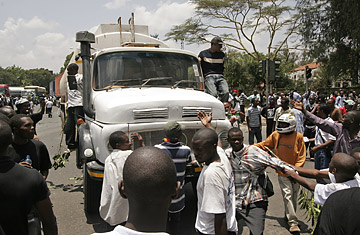
Students guide a truck they commandeered into position to block a road during protests in Nairobi
The news, when it came out last month, seemed shocking enough: Philip Alston, a U.N. special rapporteur who had come to Kenya, concluded that there exists in the country a "systematic, widespread and carefully planned strategy" of executions by police, almost certainly conducted with the consent of their top brass. Then two weeks later, two human-rights activists were gunned down in what appeared to be a well-planned attack as they sat in traffic just a few yards from State House, the home of President Mwai Kibaki. Many Kenyans immediately suspected the police were involved; the two slain men had provided detailed and extensive evidence to Alston's investigation.
Growing evidence of police executions has led to a profound sense of disillusionment among many Kenyans, who fear that their country is once again in the grip of authoritarianism, a phase most thought was relegated to the years of terror dealt out by Daniel arap Moi, who led the country from 1978 to 2002. The coalition government that was meant to restore normality after a spasm of postelection violence in early 2008 has done little to make life better, and the fact that so few police officers have been prosecuted or, indeed, have resigned after being accused has reinforced a sense that the élite are above the law. (See pictures of the postelection violence in Kenya.)
The killing of the two activists — as well as the subsequent killing of a University of Nairobi student who was shot by police while protesting the slayings — brought hundreds of students from several colleges onto the streets in protest on Tuesday. "You can see your friend being killed today. Tomorrow it might be your turn. That's what we are fighting against," said Edwin Ruto, a 22-year-old student at the University of Nairobi.
"We need the true freedom, which we haven't got, but I know it's coming," said Ali Obeid, who last saw his son while the young man was down on his knees in the custody of police. The body of Obeid's son later turned up at the morgue. "We are not in a hurry, but it will come. There is no way we can allow the police to be killing youths anytime they want."
But what began as a peaceful, almost playful demonstration got nasty very fast. First, some protesters commandeered four tractor trailers, including a tanker filled with fuel, and blocked traffic along a Nairobi highway. Three police officers who tried to talk to the students retreated under a hail of stones. Some of the protesters were clearly spoiling for a fight, chanting, "Tear gas, tear gas, we demand tear gas!" As the protest wore on, people working downtown locked themselves behind security gates in stores and restaurants and peered anxiously through the grilles.
The situation was reminiscent of student protests in the 1990s, which had a tendency to devolve into tear-gas-shrouded street battles between police and looters looking to take advantage of a demonstration to smash shop windows and nab a few things. This time, however, the protest's leaders tried to defuse the situation and urged their followers to head back to the University of Nairobi campus for a prayer session. "The direction they are now taking is not the direction we wanted," said Walter Otieno, 28, a Strathmore University student and one of the protest's leaders, who had gotten permission from Prime Minister Raila Odinga for the march to go ahead. "Our whole point was to get the masses to know that injustice happened and that someone has been killed," said student Collins Chikezie, 23. "We want Nairobi to feel the effects. If the street is blocked off, at least people will feel the impact." If so, the impact was felt. For hours, Nairobi traffic was badly snarled.
There is a pervading sense that Kenya's leaders have failed to make any progress at all since the Grand Coalition was formed with the hopes of reviving the country after postelection violence in early 2008 killed 1,200 people and displaced hundreds of thousands. In July, Kithure Kindiki, the man appointed to oversee efforts at national ethnic healing, resigned his post because he said the government was not financing his efforts. Now many people fear the coalition will collapse, and the militias responsible for much of the postelection killing are said to be rearming. And just a year after the postelection crisis, people believe Kenya needs far-reaching change again.
Meanwhile, there is popular disgust with the current crop of politicians, who are perceived to be ineffective at running the country and more interested in positioning themselves for the next presidential elections, set for 2012. Lawmakers recently fended off an attempt to tax their salaries, already among the highest in the world.
